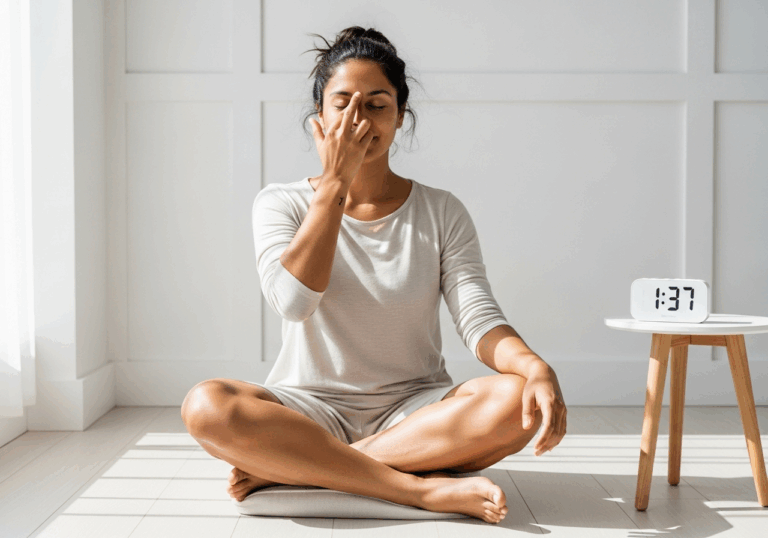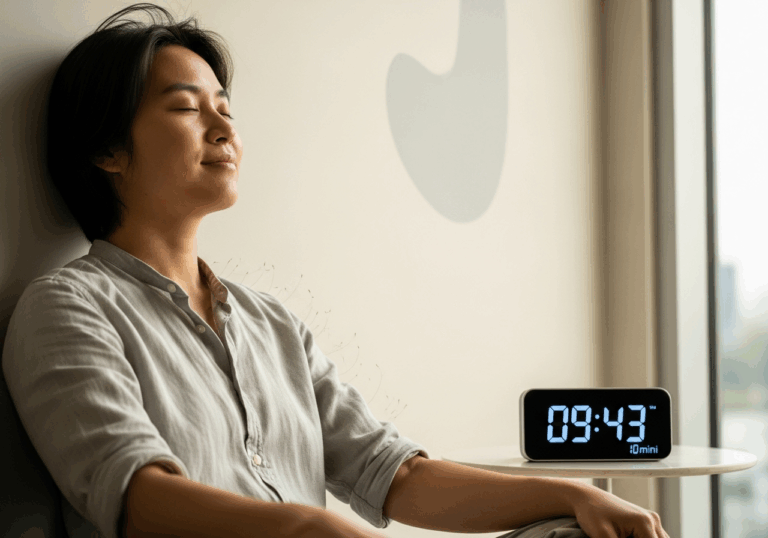Science-Backed Tips
Breathe Better: Boost Your Heart Health
Paced breathing at six breaths per minute improves HRV by 0.3–0.4.
📊 Did you know?
💡 Why It Matters
1️⃣
Improving HRV is linked to reduced stress and better cardiovascular health.
2️⃣
Enhanced emotional regulation can lead to improved mental health outcomes.
3️⃣
Increased HRV is associated with a 20% reduction in anxiety symptoms.
✅ Try These Micro-Tips
🎯
Practice paced breathing for 10 minutes daily at six breaths per minute.
🎯
Incorporate this breathing technique into your morning routine for better emotional stability.
🎯
Use guided breathing apps to help maintain the correct pace.
🎯
Engage in this practice before stressful events to enhance mood regulation.
📚 The study
Not only does improved HRV correlate with a remarkable 20% reduction in anxiety symptoms, but it also fosters better emotional regulation, paving the way for enhanced mental health outcomes.
This study underscores the importance of integrating breathing techniques into psychotherapy, offering a simple yet powerful tool for individuals seeking to manage their stress and improve their emotional well-being. By adopting these breathing practices, individuals can take proactive steps towards better health, both mentally and physically.
As we navigate an increasingly stressful world, the ability to regulate our emotions and maintain a healthy heart becomes paramount. This research not only highlights the physiological benefits of paced breathing but also emphasizes its potential as a therapeutic intervention in mental health care.
The implications of these findings are profound, suggesting that something as simple as mindful breathing can lead to significant improvements in our overall quality of life.
Embracing these techniques could be the key to unlocking a healthier, more balanced existence, making it an essential practice for anyone looking to enhance their emotional and physical health.
❓ Frequently Asked Questions ❓
Learn more
What is paced slow breathing?
Paced slow breathing is a technique that involves consciously controlling your breath rate to a specific pace, typically six breaths per minute. This method is used to enhance heart rate variability (HRV) and emotional regulation.
How does paced slow breathing affect heart rate variability (HRV)?
Paced slow breathing has been shown to improve HRV, with standardized mean differences (SMD) of approximately 0.3–0.4 compared to passive controls. Improved HRV is linked to reduced stress and better cardiovascular health.
What are the benefits of increased HRV?
Increased HRV is associated with a 20% reduction in anxiety symptoms and improved emotional regulation. This can lead to better mental health outcomes and overall well-being.
How long should I practice paced breathing each day?
It is recommended to practice paced breathing for 10 minutes daily to experience its benefits. Consistency is key for enhancing emotional stability and HRV.
When is the best time to practice paced slow breathing?
Incorporating paced slow breathing into your morning routine can set a positive tone for the day. Additionally, practicing it before stressful events can enhance mood regulation.
Can I use technology to assist with paced breathing?
Yes, using guided breathing apps can help you maintain the correct pace during your breathing exercises. These apps often provide visual or auditory cues to assist with timing.
What is the relationship between emotional regulation and mental health?
Enhanced emotional regulation can lead to improved mental health outcomes by helping individuals manage their emotions more effectively. This can reduce symptoms of anxiety and depression.
Is paced slow breathing suitable for everyone?
Paced slow breathing is generally safe for most individuals, but those with specific health conditions should consult a healthcare professional before starting. It can be particularly beneficial for those looking to manage stress and improve emotional well-being.
How does paced breathing compare to passive controls?
Research indicates that paced slow breathing results in significant improvements in HRV and emotional stability compared to passive controls. This suggests that active engagement in breathing techniques is more effective than doing nothing.
What should I do if I find it difficult to maintain the breathing pace?
If you struggle to maintain the breathing pace, start by practicing with shorter sessions and gradually increase the duration. Guided breathing apps can also provide support and help you stay on track.





